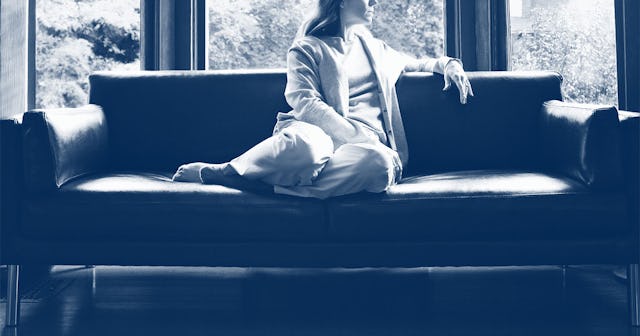I Stopped Drinking, And Then There Was A Pandemic

I have been drinking since I was 13 years old.
I honestly didn’t realize that I had a problem until the last couple of years. The problem wasn’t so much that I drank in excess, or got in trouble at work, with the law, or with my family. The problem was that I couldn’t handle the full breadth of my emotions. Too much sadness, or even too much elation, was cause for a drink. It was like my head would explode if I didn’t temper these swings with alcohol. And, of course, in managing my feelings in this way, I never learned to sit with them or realize that they would pass, or that change and growth are only possible when we work through adversity and change. I also feared that I was setting an example for my children that some emotions are not bearable, or are not acceptable. And I was physically teaching my brain that without alcohol I could not manage my life.
With help from coaches, books, and therapy, I learned that while I may not have a physical addiction, I have a psychological dependency on alcohol. I was using it to blunt the impact of life’s ups and downs. Since I was a child, friends and family have labeled me as intense, sensitive, even overly sensitive in a pejorative way. Now I realize that these “negative” qualities have actually helped me to excel in my career as a physician and as a partner and parent.
As a teenager, however, I did not appreciate the positive aspects of my emotional attributes, and often felt sad, lonely, and disconnected. I discovered that alcohol, and other substances, made me feel less impacted by perceived failures and losses. I also discovered that they made me more fun and popular and less dark and brooding, which was closer to my true nature at that time. As a culmination of all of the learning I had gathered, I decided on February 29th, 2020, the special extra leap year day, to give up alcohol.
Then, on March 11, 2020, the World Health Organization declared the Novel Coronavirus, and the disease it causes, COVID-19, a pandemic.
Obviously, quitting alcohol has nothing to do with this outbreak, and honestly doesn’t even matter in this setting of life versus death and the world’s daily fight against this virus. But, for all of us with substance related issues, this moment in history presents a particular challenge. Will we continue on our paths of numbing and getting through by using any means available, in an attempt to blunt the impact of the crushing anxiety that swirls around us from every corner of our lives? Or, will we take this as an opportunity to plow right through this most dense and terrifying emotional terrain, and consider the possibility that we can handle it on our own, without mind-altering chemicals?
I found myself in a quandary. Do I put off my abstinence proposal? Surely this is the wrong month to stop drinking, I think as I nod to Airplane, the 1980’s disaster film of my youth. Or perhaps it is exactly the right month to stop drinking, numbing, and isolating. Hunkered down in my home with my husband, children and pets, cut off from the rest of the living, breathing world, except by text, phone, Facetime, and Zoom. It is exactly the right time to give them, and myself, the opportunity to access the full spectrum of emotions this crisis will inevitably bring about.
It hasn’t been easy, that’s for sure. I have many urges that I watch pass as friends text and post visuals of “quarantinis” and free beer deliveries. I find myself feeling angry that I cannot participate in this ritual of smoothing the edges and connecting through our shared vices.
But the urges pass, and I notice myself changing how I live my life and relate to my people. Without the morning fatigue, I exercise with more strength and get my early morning work done with a clear, unashamed head. When the household wakes up, I am ready for the day, filled with our new normal of working and schooling side by side, without a headache or a regret. And, most of all, at night when I would routinely have a couple of glasses of an alcoholic drink, fall asleep on the couch, or excuse myself early to go to bed, instead I show up for my family with focus and attention.
It is in the evening when we check in. As the sun lowers, and the reality that we have faced yet another day sheltering in place against an ever present, uncertain, and unseen threat sinks in, we come together and share our feelings. Whereas I had always thought I needed alcohol to make it through intensity, I have found that it is this connectedness, unimpeded by alcohol, that is making this chaotic time manageable.
This article was originally published on